I’m still reeling and recovering from Wednesday.
With everything going on in the world, I constantly ask myself: How do I protect my mental well-being when the world is in chaos? Am I supposed to completely retreat? This is a popular strategy for folks right now, and for good reason. While meditation and journaling are in my self-care toolkit, I’m going to offer an additional perspective on self-care.
I was a hard-core anti-war activist starting in October 2001, when the US invaded Afghanistan, up until 2011 when I got totally burned out. Actually, I got burned out in 2008, but that didn’t stop me. As a result, my bipolar intensified and became more disabling.
Since disconnecting from that life of constant marches, vigils, and even an arrest, I’ve been involved in some social justice advocacy, including being on the board of a NAMI affiliate, advocating for the protection of wolves, and supporting organizations like Black Lives Matter and Color of Change. But I’m much less involved in boots-on-the-ground activism.
How can I be socially engaged and safeguard my mental health?
Marie M.
Being involved to a reasonable extent is actually good for my mental health. What is “reasonable” is relative, of course — it looks different for everybody. For me, the key is to understand the boundary between what I can and cannot control. This is tricky on many fronts. One angle, perhaps the most important for me, is that I don’t want to sell myself short. I don’t want to excuse my inaction by saying, “Nothing I do will change the situation. It’s beyond my control” and deciding to do nothing.
Being disempowered is not good for my mental health. Being active and engaged is. As all peers, advocates, and practitioners know: Connection saves lives.
As a participant in social change, I have witnessed profound transformations in people and situations. I know that my individual actions and our collective voice have an impact. I have many heroes in the movements across history, including those on the front lines today. My teachers, like Dr. Vincent Harding, and mentors who I’ve never met, like Paulo Freire, and the current racial justice movement, show me that the world is malleable to our efforts. People working for justice do change history.
I return to my question: How can I be socially engaged and safeguard my mental health? I don’t want to burn out. So, I have to determine what I can control. I can control my schedule. This is especially important for bipolar folks (see Interpersonal Social Rhythm Therapy). I draw parameters for what I will do. I will watch enough news to be aware so that I can respond compassionately to people I love and to understand my own grief in a larger societal and world context, i.e. it’s natural for my bipolar symptoms to worsen during a pandemic or an armed siege on the Capitol.
Controlling my schedule, I will read 1-2 articles from my favorite trusted news source or journalist. While this curated news usually isn’t triggering, social media always is. Completely unplugging from Facebook helps me and I need to do that more often.
Controlling my schedule, I will write one email to my congress members so that I speak my truth and hold to my beliefs while connecting to a larger community that shares my values of peace and justice.
Connection saves lives.
Marie M.
My mental health is lifted when I contribute to making the world better. I can’t do as much as Barack Obama, Greta Thunberg, or Angela Davis–not by a long-shot, but I can do something.
I feel united with something larger. I did the part I could. A part that, unfortunately, seems to be shrinking due to my intrusive and worsening disability. I will then call my friend Ellen to debrief these tough, traumatic situations. I will snuggle with my dogs, refocus on a poetry project, hug my husband, meditate, and pray.
My professor from The Iliff School of Theology, Dr. Vincent Harding, believed deeply in the transformative capacity of humans. Yet, he also recognized our limitations. I keep coming back to his words for guidance and inspiration.
Living in faith is knowing that even though our little works, our little seed, our little brick, our little block may not make the whole thing, the whole thing exists in the mind of God, and that whether or not we are there to see the whole thing is not the most important matter. The most important thing is whether we have entered the process.
Dr. Vincent Harding


